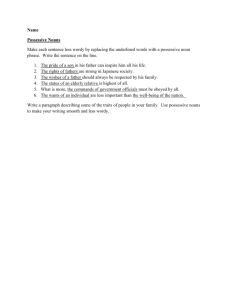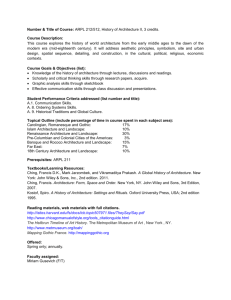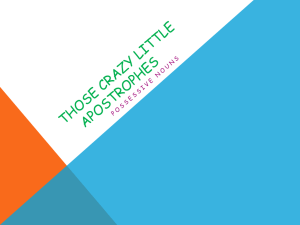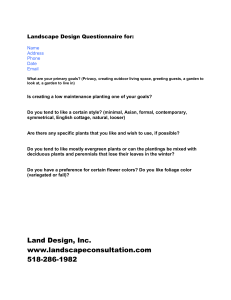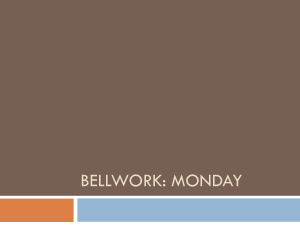Editing Tips
advertisement
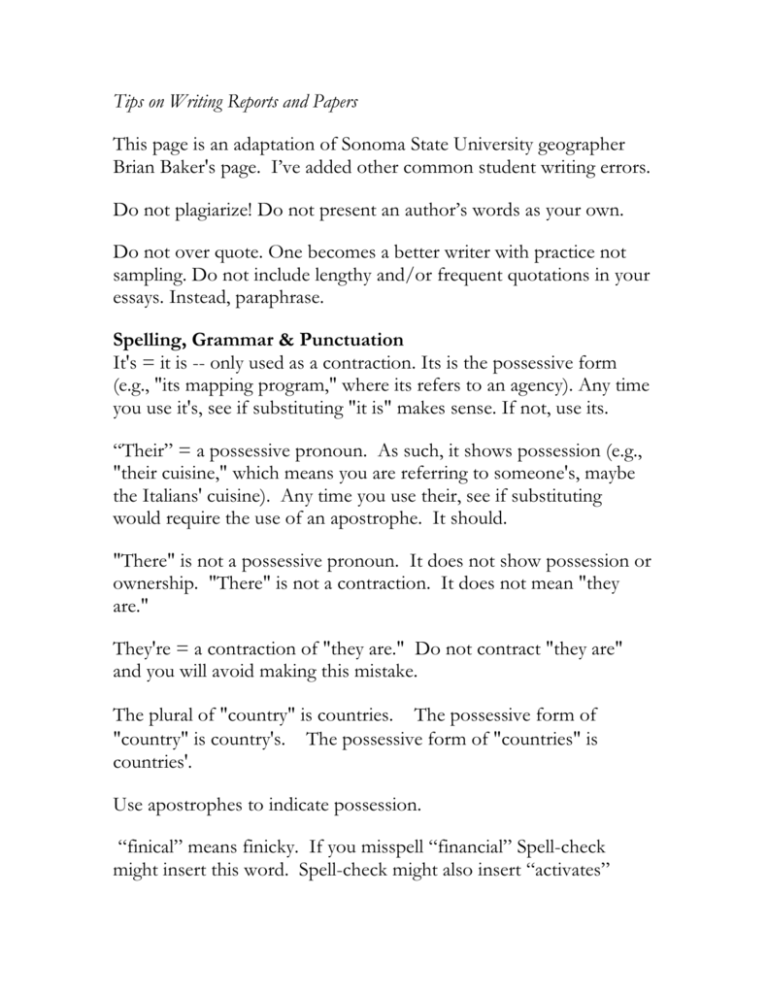
Tips on Writing Reports and Papers This page is an adaptation of Sonoma State University geographer Brian Baker's page. I’ve added other common student writing errors. Do not plagiarize! Do not present an author’s words as your own. Do not over quote. One becomes a better writer with practice not sampling. Do not include lengthy and/or frequent quotations in your essays. Instead, paraphrase. Spelling, Grammar & Punctuation It's = it is -- only used as a contraction. Its is the possessive form (e.g., "its mapping program," where its refers to an agency). Any time you use it's, see if substituting "it is" makes sense. If not, use its. “Their” = a possessive pronoun. As such, it shows possession (e.g., "their cuisine," which means you are referring to someone's, maybe the Italians' cuisine). Any time you use their, see if substituting would require the use of an apostrophe. It should. "There" is not a possessive pronoun. It does not show possession or ownership. "There" is not a contraction. It does not mean "they are." They're = a contraction of "they are." Do not contract "they are" and you will avoid making this mistake. The plural of "country" is countries. The possessive form of "country" is country's. The possessive form of "countries" is countries'. Use apostrophes to indicate possession. “finical” means finicky. If you misspell “financial” Spell-check might insert this word. Spell-check might also insert “activates” when you meant “activities”. A spell check tool would not catch the common errors mentioned above. The lesson here is that you must proofread your writing before submitting it. Learn to use apostrophes correctly so that you can avoid using “of the”. For example: “The energy use of the farmers…” “The farmers’ energy use…” Even better: “Farmers energy use…” Capitalizing: We are not writing in German. Do not capitalize all nouns. Capitalize only proper nouns, i.e., names of specific things -the European Union is one object, but geographic information systems and biology aren't, so don't use initial capitals. “Bay Area” is the name of a place. Capitalize it. You should not capitalize cardinal directions (east, west…) unless they occur as the first word in a sentence, or a part of a proper noun (East Biggs) Word Use Very is a very weak adjective. “Very unique”? The word “unique” already implies “very”. Nice, very, good, fairly, good-sized. These are useless adjectives in a landscape description. Do not use them. Quality requires a modifier. The phrase “quality work” does not indicate the work’s quality. Principle vs. Principal. A principal can be a noun, such as the chief administrator of a school. Principal can also be an adjective, which means the most important, primary, basic or main. So, when Hart identifies the principal components of a landscape, he means the three main components of a landscape. Principle is always a noun. It means an idea, law, proposition… “Since” refers to the passage of time, not a causal relationship. To indicate a causal relationship, use “because”. Style Usually you should not use the words of my questions to create a sentence. The result is often awkward. Long, complex sentences: Break these into two or more simpler sentences. Long sentences are difficult for readers to follow. Newspapers are some of the worst offenders, by the way! Often a period is more appropriate than a comma. If you have written a sentence that includes 3 or more commas, and does not include a list of items, you should break it down into two or more sentences. Avoid passive voice whenever possible. Example of passive: "The coal deposits were exploited by incipient industrialists." Active substitute: "Incipient industrialists exploited coal deposits." There is (are, was, were)... Reword sentences beginning with "there is" or “there are” whenever possible. This construction is distracting and boring. Example: "There are many different landscapes in France like bocage, forested uplands, elite, coastal fringes ..." Substitute "France includes diverse landscapes like bocage, forested uplands, elite, coastal fringes ..." Do not write in a conversational style. If you want to have a conversation, come to office hours and we will converse. For example “way more”. Omit parenthetical phrases. Integrate the information within the parentheses into your sentences. Do not use clichés. Organize your responses to the readings in paragraphs, not a single block of text. Often your answer to a single “question to consider” can comprise a complete paragraph. Do not use my question in your answer. For example, here’s one of my questions: “What are Madison’s ideas related to the district becoming self-sufficient in energy?” Some of you began you answer like this, “Madison’s ideas related to the district becoming selfsufficient in energy.” Creating a clear and grammatical sentence out of this is difficult if not impossible. Instead, you can begin your answer like this: “Madison believes production of canola and safflower will lead the district to energy self-sufficiency.” Be certain that you clearly identify the correct actor that is performing the action of a verb. For example, in the following phrase the actor is incorrectly indicated. “by emphasizing his procedure for landscape study which advocates...” A procedure does not advocate. An author might advocate. Keys to Concision: Our motto is “Cut, cut and when in doubt cut some more.” Eliminate “in order” from your papers. For example, “In order to describe the landscape…”. Just write “To describe the landscape…” Often you can eliminate the direct article of a noun without creating an awkward or ungrammatical sentence. “To describe the landscape…” “To describe landscape…” Use one verb instead of two. “give indication”? Why not simply “indicate” Symbols. I write symbols on your papers to communicate. Below I define those symbols. Star (within the body of the text) = That is interesting. What a great idea! This is a fine sentence. WDYM = What do you mean? Your sentence makes no sense. RTTY = Read this to yourself. SF = Sentence fragment Look again = You missed the author’s point. You should re-read that section. Words that I have crossed out indicate that I’ve shown you how to improve your sentence by eliminating and/or re-arranging words. A circle around a word = Poor word choice.

